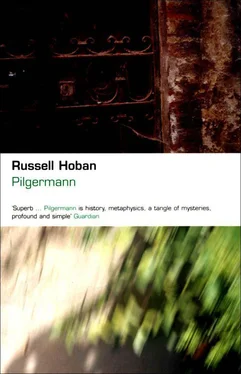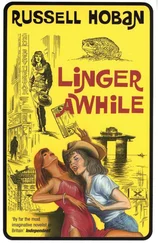Russell Hoban - Pilgermann
Здесь есть возможность читать онлайн «Russell Hoban - Pilgermann» весь текст электронной книги совершенно бесплатно (целиком полную версию без сокращений). В некоторых случаях можно слушать аудио, скачать через торрент в формате fb2 и присутствует краткое содержание. Год выпуска: 2002, Издательство: Bloomsbury Publishing PLC, Жанр: Современная проза, на английском языке. Описание произведения, (предисловие) а так же отзывы посетителей доступны на портале библиотеки ЛибКат.
- Название:Pilgermann
- Автор:
- Издательство:Bloomsbury Publishing PLC
- Жанр:
- Год:2002
- ISBN:нет данных
- Рейтинг книги:5 / 5. Голосов: 1
-
Избранное:Добавить в избранное
- Отзывы:
-
Ваша оценка:
- 100
- 1
- 2
- 3
- 4
- 5
Pilgermann: краткое содержание, описание и аннотация
Предлагаем к чтению аннотацию, описание, краткое содержание или предисловие (зависит от того, что написал сам автор книги «Pilgermann»). Если вы не нашли необходимую информацию о книге — напишите в комментариях, мы постараемся отыскать её.
Pilgermann — читать онлайн бесплатно полную книгу (весь текст) целиком
Ниже представлен текст книги, разбитый по страницам. Система сохранения места последней прочитанной страницы, позволяет с удобством читать онлайн бесплатно книгу «Pilgermann», без необходимости каждый раз заново искать на чём Вы остановились. Поставьте закладку, и сможете в любой момент перейти на страницу, на которой закончили чтение.
Интервал:
Закладка:
‘The murderer too sees God,’ said Bembel Rudzuk, ‘and perhaps more than others. In any case this idea cannot possibly harm anyone as far as I can see. Can you see any harm in it?’
‘No,’ I said, ‘I cannot.’
This conversation was taking place at the close of day, after the sunset prayer. Behind Bembel Rudzuk’s words I heard the falling water of the fountain, the cooing of doves. There came into my mind the twilight at Manzikert on the day of the battle in 1071, the year of my birth. This twilight I knew in my soul, I knew it to be Bruder Pförtner’s courtyard, the quiet place where plashes the fountain of his reverie. At the close of that August day at Manzikert the Byzantine Emperor Romanus IV Diogenes must have felt what he had become as the day waned: no longer a man but a line on a map, the ebbing tide-line of Byzantium, ebbing from the sharp edge of the present like blood from a knife. Andronicus and the rear line gone and the Turks all round like murderous stinging bees. Romanus must have smelt Bruder Pförtner’s breath, fresh and salty like the wind from the sea, he must have felt himself at that turning centre of all things where stillness revolves into motion and motion into stillness. Aiyee! must have cried the life in him as his blinding and his death moved towards him in that twilight at Manzikert. As Byzantium receded with him towards the allness of everything.
I found myself weeping for Romanus Diogenes and for that Jew who was made to be his executioner. In that twilight in the courtyard of Bembel Rudzuk in Antioch I thought also of Alexius Comnenus, now in 1096 Emperor of Byzantium. The reality of his empire presented itself to me all at once like a naked idiot: he was emperor of the passing of Byzantium, his empire was becoming moment by moment the illusion of, the non-reality of, the unpotentiality of Byzantium. At some point the naked idiot of this actuality became the naked truth of it and I saw, or perhaps I am only just now seeing, or perhaps I have not yet seen and I am at some time going to see that the names of things, of times, of places, of events, are useful for reference and they have some subjective meaning but as often as not they obscure the actuality of the thing they attempt to describe. Now as I think about it I see that we don’t always know what it is that we are putting a name to. We are, for example, clever enough to know that a year is a measure of passage, not permanence; we call the seasons spring, summer, autumn, and winter, knowing that they are continually passing one into the other. We are not surprised at this but when we give to seasons of another sort the names Rome, Byzantium, Islam, or Mongol Empire we are astonished to see that each one refuses to remain what it is.
‘Why are you weeping?’ said Bembel Rudzuk.
‘I am suffering from an attack of history,’ I said.
‘It will pass,’ said Bembel Rudzuk.
‘Where is this tile pattern to be done?’ I said.
‘I have bought a piece of land just inside the wall at the foot of Mount Silpius not far from the Tower of the Two Sisters,’ he said.
‘And you’re having a house built on it?’ I said.
‘No,’ he said, ‘I have had it prepared as a plane for tiling. I have had the ground cleared and paved with stone so that it’s perfectly flat. It’s one hundred and twenty feet by one hundred and twenty feet.’
‘That’s fourteen thousand four hundred square feet of pattern,’ I said. ‘Why does it have to be so big?’
‘Ask rather why it’s no bigger,’ he said. ‘And the answer to that is that this was the biggest piece of land available within the wall. Ideally the plane would extend to the horizon on all sides.’
‘Why is that?’ I said.
‘Because in this case the ideal is the maximum effort possible,’ he said, ‘and the horizon is the outer limit of how much of the pattern can be taken in by the eye.’
‘It wouldn’t do to draw it on a piece of paper to hold in the hand?’ I said.
‘No,’ he said, ‘As you must know in your heart, it is not only the apparent quantity of a thing that changes with the degree of effort, the manifest character of it changes also as Thing-in-Itself reveals more of itself.’
‘Is that what the pattern is for?’ I said: ‘To show Thing-in-Itself?’
‘You know as well as I do,’ he said, ‘that Thing-in-Itself is not to be seen nor is it to be sought directly. My desires are modest; there are simply one or two things I should like to observe, one or two things I should like to think about.’
‘Can you tell me what they are?’ I said.
‘Motion is one of them,’ he said. ‘There is transitive motion and there is intransitive motion: the motion of a galloping horse is transitive, it passes through our field of vision and continues on to wherever it is going; the motion in a tile pattern is intransitive, it does not pass; it moves but it stays in our field of vision. It arises from stillness, and I should like to think about the point at which stillness becomes motion. Another thing I should like to think about is the point at which pattern becomes consciousness.’
‘Does it?’ I said. ‘Can this be proved?’
‘I know in my innermost being that it does,’ he said, ‘and I know that we ourselves are the proof of it, but whether this proof can be demonstrated I don’t know. It may well be that the proof is being demonstrated constantly but in our ignorance we cannot recognize it.’
‘This design that you want me to make,’ I said, ‘how should it look?’
‘That will come from you,’ he said. ‘It will come from your hand at the moment when you begin to draw. Try not to think about it beforehand, don’t let your mind become busy with it.’
‘My mind is already busy with it,’ I said. ‘How could it not be?’
‘In that case you should do it now,’ he said, ‘and we must go to the place where it is to be done.’ From a cabinet he took a straight-edge and a large wooden compass fitted with a piece of chalk and we left the house.
Through the darkening murmurous evening, past the lamps of evening and the smells of cooking we made our way to the paved space at the foot of Mount Silpius near the Tower of the Two Sisters. The town was still murmurous but all the voices of the day that had been close were now distant. Before us Mount Silpius gathered itself into night. The lamplight in the windows of the towers made the stone around them bulk darker against the sky. Someone was playing an oud, someone was singing; it was a woman’s voice rising and falling in a pattern of repetition contiguous with infinity. Warm and sad the voice, a woman of flesh and bone, contiguous with infinity! On Bembel Rudzuk’s paved square some boys were kicking a blown-up bladder that rasped with a skittering rush across the stone, each thump of the kicking like the unsequent beat of a disembodied heart; the voices of the boys appeared at sudden places in the gathering night, now near, now far; their feet scuffled mysteriously on the stone.
That evening Bembel Rudzuk and I felt ourselves to be inside the walls of Antioch, how could we not? There were the walls of stone all strong and thick and guarded by soldiers, there were the towers with their lamplit windows girdling the city in the encircling night. Yet even then, so contiguous was my mind, is my mind, with infinity that my thoughts found themselves here in this present space in which only broken remnants of those strong walls stand and the inside is seen to be one with the outside. My consciousness that evening in 1096 came forward to the present and the toothless broken stones of now, and my present consciousness goes back to the great thick towered walls forty feet high and paced by weaponed men.
Strong walls, always have strong walls been walked by weaponed men. And those who came and took Antioch, such stones they captured in their strong places up and down the land, such stones they put together in their Latin Kingdom, those strong men and those who came after them! As Pilgermann the owl I fly on silent wings above them looking down. Lion-stones, warrior stones, now they have peace. How they sing in their silence, how they are easy, the great strong stones, the lion-stones, the tawny. Even they, the strong stones of the great Jew-killers, even they have longed for ruin and the stillness, for the wind sighing over them, for the grass growing on roofless walls and alone-standing arches. Even when the arrows hissed from the loopholes the stones were singing the stillness to come, the clopping of cows’ hooves up and down the stone steps where those iron-ringing men walked in their time. Now the stones have arrived at the strong life of the stillness of them, their strong song, their stillness dancing in the sun.
Читать дальшеИнтервал:
Закладка:
Похожие книги на «Pilgermann»
Представляем Вашему вниманию похожие книги на «Pilgermann» списком для выбора. Мы отобрали схожую по названию и смыслу литературу в надежде предоставить читателям больше вариантов отыскать новые, интересные, ещё непрочитанные произведения.
Обсуждение, отзывы о книге «Pilgermann» и просто собственные мнения читателей. Оставьте ваши комментарии, напишите, что Вы думаете о произведении, его смысле или главных героях. Укажите что конкретно понравилось, а что нет, и почему Вы так считаете.












